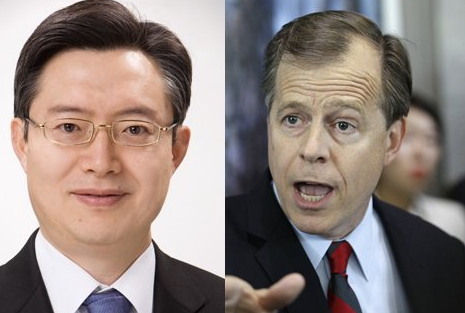South Korea's top nuclear envoy left for the United States on Monday for negotiations with his U.S. counterpart on ways to resume the long-stalled six-party talks aimed at ending North Korea's nuclear weapons program.
Hwang Joon-kook, special representative for Korean Peninsula peace and security affairs, is scheduled to meet Glyn Davies, the U.S. envoy on North Korean policy, according to the foreign ministry. The trip comes only about three months after he last visited Washington to meet Davies.
 |
(Left) Hwang Joon-kook, special representative for Korean Peninsula peace and security affairs, and Glyn Davies, the U.S. envoy on N. Korea policy (Yonhap) |
"We plan to assess situations on the Korean Peninsula, given recent changes in circumstances," Hwang told Yonhap News Agency by phone before departing to the U.S. for a three-day visit. "The two sides plan to check North Korea's nuclear issues and fine-tune the future plan."
His visit to the U.S. is seen as being hastily arranged ahead of South Korea's fall harvest Chuseok holiday that falls on Monday.
The visit comes at a delicate time, when speculation is rising that the U.S. may send a special envoy to the North to win the release of three detained American citizens.
Kim Kwan-jin, Seoul's top national security adviser, is also expected to visit the U.S. in September to meet with his counterpart, Susan Rice, to discuss the North Korean issue and other pending bilateral affairs.
The six-party talks aimed at curbing the North's nuclear ambitions have been dormant since late 2008, when Pyongyang walked away from the negotiating table. The talks involve the two Koreas, the U.S., China, Russia and Japan.
North Korea has called for an "unconditional" resumption of the talks, but Seoul and Washington insist that Pyongyang should first take concrete steps toward denuclearization.
In the meantime, China has renewed its commitment to an early resumption of six-nation nuclear talks ahead of the U.N. General Assembly later this month.
In its "Position Paper," dated Friday, to the U.N. meeting, China said it "hopes that the parties concerned will refrain from any action that may raise tensions, engage in contact and dialogue, stay committed to resolving differences through negotiation and work for the early resumption of the six-party talks."
The long-stalled multilateral talks are still a "practical and effective platform for addressing the concerns of all parties in a balanced manner and achieving denuclearization on the (Korean) Peninsula," China said in the paper posted on its Foreign Ministry's website. (From news reports)






![[Today’s K-pop] Blackpink’s Jennie, Lisa invited to Coachella as solo acts](http://res.heraldm.com/phpwas/restmb_idxmake.php?idx=644&simg=/content/image/2024/11/21/20241121050099_0.jpg)
